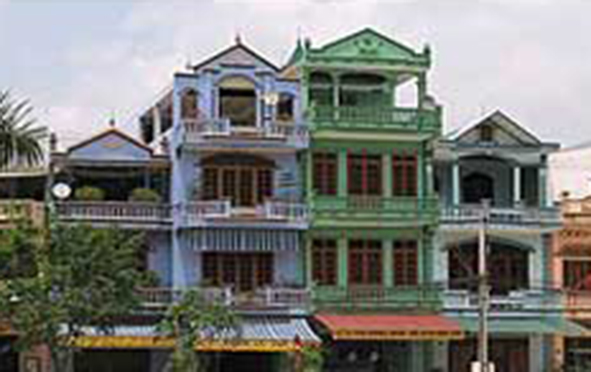However after several years of falling house prices, Vietnam’s housing market seems to be gradually improving. House price declines significantly decelerated in Q1 2014. Residential construction activity is recovering. Demand is picking up.
However Vietnam's situation is fragile. The economy is slowing, and its banks are riddled with bad debt. Foreign investors were worried even before the recent riots. Foreign direct investment (FDI) fell 22% y-o-y to January 2014, to US$397 million.
To aggravate the situation, the recent anti-Chinese riots further threaten foreign investment. The violent protests, which initially targeted Chinese factories, then spilled over to facilities of other global manufacturers. More than 400 factories were reportedly damaged and there were about 21 people killed in the riots.
Nevertheless, after 4 years of house price falls, there have been signs that the downward trend may be stabilising, especially in Ho Chi Minh City. During the year to end-Q1 2014:
- In Hanoi residential property prices fell by 7.7% (-7.91% inflation-adjusted), the tenth consecutive quarter of annual price falls, based on latest figures released by Savills Vietnam.
- In Ho Chi Minh City, the country’s largest city, residential property prices dropped only 0.11% (-0.38% inflation-adjusted), the 16th quarter of annual price declines.
Clearly, recovery has not yet arrived. Signs of an economic slowdown emerged in 2013 when GDP growth fell to 5.4%, down 6.7% between 2000 and 2012, according to the International Monetary Fund (IMF). During the first quarter of 2014, the country’s economic growth again slowed to 4.96% y-o-y, according to the General Statistics Office (GSO).
Vietnam has the highest bad debt burden among Southeast Asia’s bigger economies. Much money lent during the credit boom (2009-2010) went bad, much owed by big state enterprises. Moody’s Investors Service estimates bad debts at about 15% of total loans. However, this is disputed by the State Bank of Vietnam, the country’s central bank, claiming that bad debt accounts for just 9% of total loans.
The good news is that the government is actively bolstering demand:
- The State Bank of Vietnam (SBV) discount rate was cut to 4.5% from 5%, the refinancing rate to 6.5% from 7%, and the repurchase rate to 5% from 5.5%.
- The Ho Chi Minh City government has proposed opening the property market to overseas Vietnamese.
- An exemption of about 10% of the value added tax (VAT) for home buyers is being proposed by the Housing and Real Estate Market Department.
- Homebuyers were given a VND5 trillion (US$240 million) credit package by the Vietnam Bank for Industry and Trade (Vietinbank).
- Effective January 5, 2014, Decree 11/2013/ND-CP and Joint Circular No.20/2013/TTLT-BXD-BNV allows property investors to sell land plots with fully completed infrastructure and without a raw building.
Residential construction has been gradually improving. In Ho Chi Minh City, there were about 15,500 apartment units in the primary market in Q1 2014, up 1.5% q-o-q, but down by 1.8% from a year earlier, according to Savills. In the first quarter of 2014, the total number of newly launched apartments in HCMC was about 2,800 units, the highest level since Q2 2011. On the other hand, in Hanoi, the total number of newly launched apartments increased 5% q-o-q in Q1 2014, putting the total supply of apartments to 95,400 units.
In Ho Chi Minh City, the total number of apartments sold fell by 4% q-o-q to 1,600 units in the first quarter of 2014, but was significantly up by 39% from a year earlier. Grade C projects accounted for about 70% of the volume of transactions. On the other hand, apartment sales in Hanoi dropped by 6% q-o-q over the same period.
In Hanoi, the average apartment price in the primary market stood at about VND24.5 million (US$1,174) per square metres (sq. m.) in Q1 2014, according to Savills. Cau Giay had the highest average asking price for both villas and townhouses at about VND133 million (US$6,373) per sq. m., followed by Tu Liem and Tay Ho with asking prices between VND 91 million (US$4,361) and VND 104 million (US$4,983) per sq. m.
 “In an attempt to promote sales, developers are now applying unprecedented payment terms," ,” according to CBRE Vietnam. "For instance, buyers in the first phase of Gamuda Gardens (part of Gamuda City) can now move in upon the first 20% payment; the remaining 80% can be made over four years at 0% interest. In the context of abundant supply and increasing competition from mid-to-low-priced condominiums, such flexible payment terms is one of smarter ways that developers can use to stimulate sales."
“In an attempt to promote sales, developers are now applying unprecedented payment terms," ,” according to CBRE Vietnam. "For instance, buyers in the first phase of Gamuda Gardens (part of Gamuda City) can now move in upon the first 20% payment; the remaining 80% can be made over four years at 0% interest. In the context of abundant supply and increasing competition from mid-to-low-priced condominiums, such flexible payment terms is one of smarter ways that developers can use to stimulate sales."
So while a turnaround is unlikely in 2014, house price falls are projected to continue to decelerate, according to local real estate experts.
Source: www.globalpropertyguide.com

